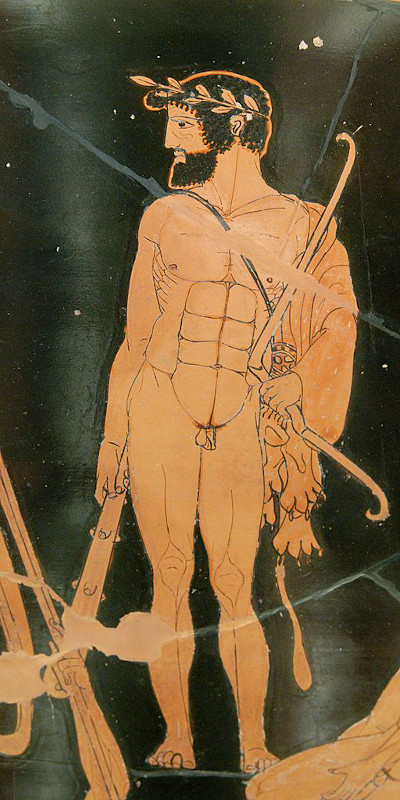
Hera and Her Pre-Hellenic Roots
As queen to Zeus’s king, it is ironic that, Hera, the Olympian goddess of marriage, should herself be a miserable one. With a predilection for inciting vengeance against her husband’s innumerable paramours and their hapless offspring, a neglected Hera plays the quintessential jealous wife to the ever-unfaithful Zeus—Olympian lord of the gods. Never mind that Zeus’s paramours more closely resemble victims than lovers, she never let justice stand in the way of divine retribution. Unloved and unloving, Hera is easily the most unlikable of all the Olympian gods, which is why it is surprising that for all her savagery, she was also one of the most celebrated and piously revered of deities throughout the ancient Greek world.
As the only wedded of the Olympian goddesses, she is regarded as the patron goddess of marriage as well as the goddess of women and childbirth. Because she presided over lawful unions, at weddings her presence loomed large. Moreover, Hera holds an exalted place in the Olympian pantheon, not only is she the wife of Zeus but she is also his sister. In Hesiod’s Theogony, Hera was the eldest daughter of the king and queen of the Titans: Kronos and Rhea.
- Unravelling the Roots of Hera, the Wrathful Goddess of Marriage
- The Fall of Hera: Demoted from Autonomous Goddess to Wife of Zeus
Given the numerous accolades she has received—to the exclusion of other more benevolent deities—it is difficult to come to terms with Greek literature's depiction of the vengeful and cruel Hera with the benevolent deity who is worthy of celebration. Why was Greek literature unkind to Hera? Moreover, what could account for the stormy relationship between Zeus and Hera? While examining the causes behind her character development, archaeological finds—- particularly her temples— will be reviewed to help determine the historical beginnings of Hera and her worship.
Though a full inventory of her cruelty is beyond the scope of this article, the following are some of the most notorious tales of her brutality beginning with the tragic tale of Io. As Hera’s first priestess, Io initially rejects Zeus's unwanted advances but ultimately, she is powerless to oppose the will of the mightiest of all gods. In conflicting accounts, Zeus either turns Io into a heifer—presumably to protect her from Hera's wrath—or Hera performs the transformation herself. Hera, however, takes matters one step further when she ties Io to an olive tree while using the hundred-eyed Argus to keep watch over her ostensibly to make sure she has no further trysts with Zeus. Her evil streak unabashed, Hera then dispatches a gadfly to torment and relentlessly hunt poor Io to the farthest reaches of the planet.
Semele, mother of Dionysus by Zeus, is also one of Hera’s targets. Hera, disguised as a nurse, convinces Semele to implore Zeus to expose himself in all his glorious majesty, aware that the sight of his unshielded holiness will instantaneously destroy her—which it does. The exquisite nymph Callisto is the next to succumb to Zeus' insatiable desire—and Hera's never-ending wrath. Alas, when Hera discovers Callisto is pregnant with Zeus' child, she transforms her into a bear.
Lastly, there is the story of Princess Alcmene, who was reputed to be the tallest and most exquisite of mortal women. When she becomes pregnant with Zeus’s child, Hera ties Alcmene's legs together to stop her from giving birth but her attempts are unsuccessful, and the Greek hero Heracles—her arch-enemy— is born. To add insult to injury, Hera is tricked by Zeus into nursing the half mortal/half divine creature. Because he was nursed by a goddess, the infant would grow strong and fierce.

Attic red-figure calyx-krater depicting Heracles. (Jastrow / CC BY-SA 2.5)
After discovering the infant’s identity, Hera violently throws Heracles off her breast causing her breast milk to spew into the sky creating the Milky Way galaxy. But the fall was not enough to foil the infant hero so Hera dispatches two snakes to strangle him in his cot while he lay sleeping. The snakes, however, would lose the match when baby Heracles strangles them instead and uses their dead carcasses as toys. The animosity between Hera and Heracles is legendary and follows him into adulthood when she finally drives him into madness forcing him to kill his wife and children.
To understand why Greek literature was unkind to Hera it is useful to consider pre-Greek (or pre-Hellenic) history. In the 18th century BC, the Mycenaeans–an advanced warrior society— invaded the Aegean region conquering the indigenous pre-Hellenic mainland. Representing the first characteristically Greek civilization, Mycenaean Greece dominated the last phase of the Bronze Age from approximately 18th to 11th century BC. They are called the “first Greeks” because they were the first to use the Indo-European Greek language. To be sure, subsequent DNA testing has revealed a common genetic heritage between today’s Greeks and their Mycenaean ancestors. Although they were initially under Minoan political hegemony, by 1400 BC they added the legendary Minoan Island of Crete and nearby islands to their long list of conquests becoming the dominant power in the region.




